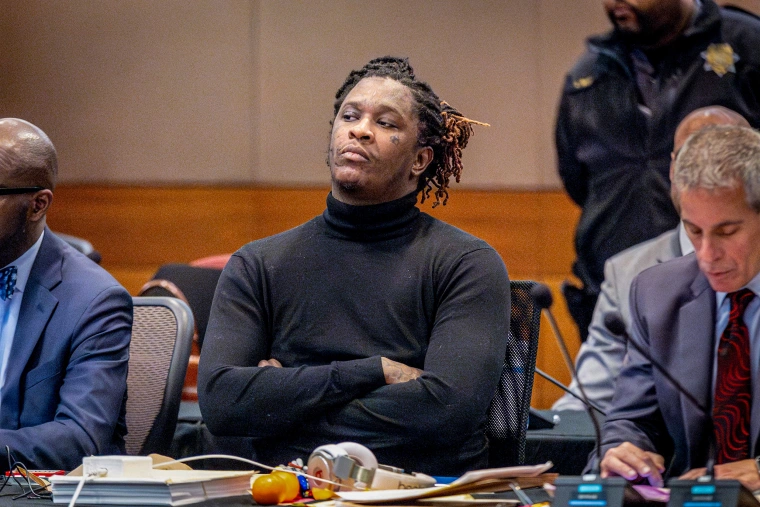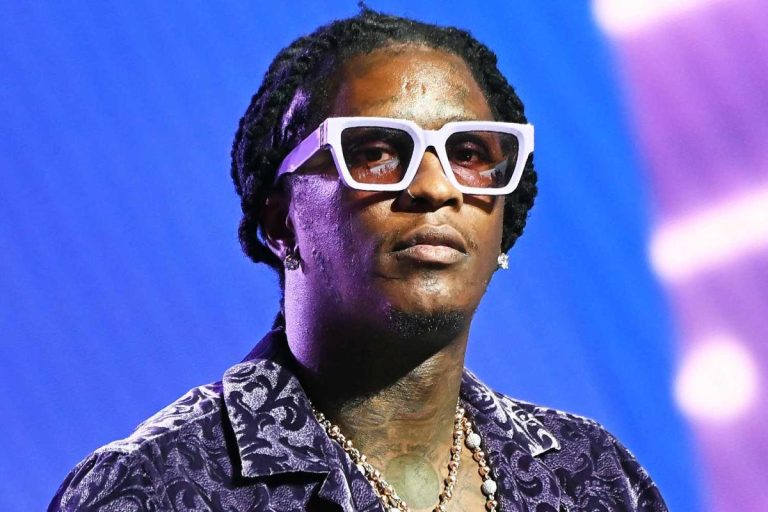Georgia’s longest-running criminal trial ended Tuesday with not guilty verdicts, except for one charge, for the two remaining co-defendants in a sprawling racketeering case that had involved rap superstar Young Thug.
Deamonte Kendrick, a rapper known as Yak Gotti, and Shannon Stillwell, the defendants, faced charges linked to the state’s Racketeer Influenced and Corrupt Organizations (RICO) statute. The most serious charges included the killing of an alleged rival gang member in a 2015 drive-by shooting and conspiracy to violate RICO. Stillwell also faced a murder charge in the 2022 killing of another alleged rival gang member.
The 12 jurors began deliberating on Nov. 26, returning a not guilty verdict for Kendrick and a not guilty verdict for Stillwell, except for one felony firearm charge.
Kendrick was stabbed on Sunday in a Fulton County Jail annex.
The case initially featured 28 co-defendants, including Young Thug, whom Fulton County prosecutors accused of leading the Atlanta street gang Young Slime Life (YSL) in a 2022 indictment. (Young Thug founded YSL Records in 2016.)
The trial against the co-defendants started in January 2023 but faced multiple delays and unexpected turns after several defendants accepted plea deals, and others chose separate trials from Young Thug, whose real name is Jeffery Lamar Williams.
Opening statements began in November 2023 with six co-defendants. The trial, livestreamed to the public, captivated social media users as prosecutors used the Grammy-winning rapper’s song lyrics to claim violence and illegal acts. The trial also featured bizarre moments involving alleged drug exchanges, uncooperative star witnesses, and combative incidents with the previous judge.
By the end of the trial, the state had called more than 175 witnesses, while the defense for Stillwell and Kendrick called no witnesses.

During closing arguments on Nov. 25, Fulton County prosecutors argued that the defendants participated in a criminal street gang that used weapons against rivals. “They have guns and were not afraid to use them,” said Assistant District Attorney Christian Adkins.
Adkins further stated that YSL employed “deception, intimidation, destruction, and death,” with members “bragging and boasting” about their actions on social media and in songs.
He explained that to convict the defendants of violating RICO, jurors must determine that the men either conspired to acquire or maintain money or property, or conspired to participate in an enterprise through a pattern of racketeering.
Stillwell’s lawyer, Max Schardt, later told the jury that the prosecution’s attempt to present a gang conspiracy was like “trying so hard to fit that square peg into a round hole.” He also denied that his client had killed anyone, casting doubt on the credibility of witnesses who admitted on the stand to lying to the police.
“The state hasn’t proven their case,” Schardt argued, “and certainly hasn’t proven their case beyond a reasonable doubt.”
Kendrick’s lawyer, Doug Weinstein, mocked the state’s claim of gang affiliations among Young Thug and other YSL artists and associates.
“Pictures of YSL wearing green clothing — that must mean they’re a gang,” Weinstein said. “You guys are mostly in blue and black, you associate with each other here today. Are you a gang? The state is all in red today. Are they a gang because they’re all dressed in red?”
Fulton County District Attorney Fani Willis initially presented the case against Young Thug and his associates—accused of being linked to the national Bloods gang—as part of an effort to address the ongoing violence in their south Atlanta neighborhood.
Willis, who would later face scrutiny over her handling of the 2020 election case against Donald Trump and his associates, was criticized by some for using Young Thug’s song lyrics and social media posts as evidence to suggest gang activity.
Critics argued that the state’s RICO law was being weaponized to specifically target Black hip-hop artists, claiming that these artists should be free to express themselves.
In July, the state’s case nearly fell apart when the original trial judge was removed after holding a private meeting with prosecutors and a star witness, excluding defense members. Defense lawyers unsuccessfully pushed for a mistrial.
Then, in October, the trial almost faced another setback when a state witness was accidentally given a social media post to read aloud that contained the unredacted nickname of two co-defendants, which was meant to be kept confidential for the jury. This prosecutorial error raised the possibility of a mistrial, prompting Superior Court Judge Paige Whitaker to see if plea deals could be negotiated between prosecutors and defense lawyers.
Ultimately, four of the six co-defendants reached agreements. Young Thug, who took a deal, was released from jail, with his 40-year sentence commuted to time served and 15 years of probation.
Young Thug gained mainstream success in 2014 with his drug anthem “Stoner” and has collaborated with artists such as Travis Scott, Post Malone, Meek Mill, and Drake. He also achieved three No. 1 albums on the Billboard chart and won a Grammy Award in 2019 for Song of the Year for co-writing Childish Gambino’s “This Is America.”
Georgia’s previous longest criminal trial lasted about eight months and involved Atlanta public school educators accused of racketeering in a cheating scandal.

